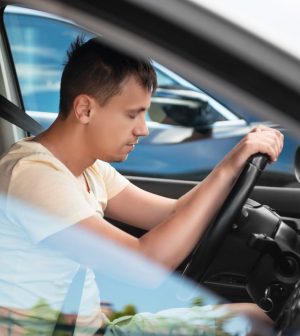- Could Your Grocery Store Meat Be Causing Recurring UTIs?
- Are You Making This Expensive Thermostat Error This Winter?
- Recognizing the Signs of Hypothyroidism
- 10 Strategies to Overcome Insomnia
- Could Artificial Sweeteners Be Aging the Brain Faster?
- Techniques for Soothing Your Nervous System
- Does the Water in Your House Smell Funny? Here’s Why
- Can a Daily Dose of Apple Cider Vinegar Actually Aid Weight Loss?
- 6 Health Beverages That Can Actually Spike Your Blood Sugar
- Treatment Options for Social Anxiety Disorder
Too Many Teens Are Driving Drowsy

Teens on the verge of falling asleep behind the wheel is a common threat to public safety on U.S. roadways, a new study reports.
About 1 in 6 teenage drivers say they’ve driven while drowsy, according to a National Sleep Foundation study presented Wednesday at the annual meeting of the Associated Professional Sleep Societies in Houston. The research was also published in a special supplement of the May issue of the journal Sleep.
That finding means that about 1.7 million teenage drivers have driven while sleepy, and more than 400,000 teens drive drowsy at least once a week, researchers estimated.
“This is a troubling rate, especially given that teens are new drivers with relatively low opportunity to have engaged in drowsy driving when compared to the lifetime of driving opportunities in adults,” said principal investigator Joseph Dzierzewski, vice president of research and scientific affairs at the National Sleep Foundation.
Teens know it’s not safe — about 95% said drowsy driving is extremely or very risky, poll results show.
However, they listed drowsy driving as having the lowest risk of death or serious harm when compared to drunk, drugged or distracted driving, researchers found.
Most teens said work or school schedules keep them from getting the sleep they need to drive alert.
Teen drivers with jobs were more than twice as likely to have driven drowsy as teens without jobs, results show.
“Drowsy driving represents an immediate, and potentially tragic, consequence of poor sleep health, residing at the literal intersection of sleep health and public safety,” Dzierzewski said in a news release.
The survey involved 1,124 U.S. teens ages 13 to 17, researchers said.
More information
The Sleep Foundation has more on drowsy driving.
SOURCE: American Academy of Sleep Medicine, news release, June 4, 2024
Source: HealthDay
Copyright © 2026 HealthDay. All rights reserved.










